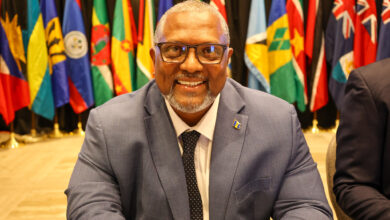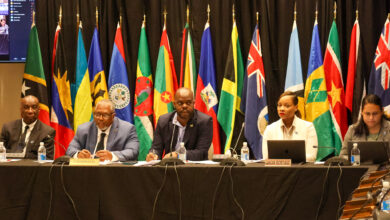Citing a recent study by the University of the West Indies (UWI) Health Economic Unit and the Caribbean Epidemiology Centre (CAREC), which estimates that by next year Jamaica and Trinidad and Tobago could lose between 4 and 6.4% of their Gross Domestic Product (GDP) as a result of the impact of HIV/AIDS, Secretary-General of the Caribbean Community (CARICOM), Mr. Edwin Carrington on Tuesday thanked the Inter-American Development Bank (IDB) for its assistance to the Region's HIV/AIDS programme.
Mr. Carrington was speaking in Georgetown, Guyana at the signing of a US$680,000 Agreement between CARICOM and the IDB for the Caribbean Education Sector HIV/AIDS Response Capacity Building Programme.
The CARICOM Secretary-General said the grant, which is funded by the Government of Japan and administered by the IDB, would fill an essential gap in the strategy framework of the Pan Caribbean Partnership (PANCAP), which was formed in 2001 as a part of the actions by Caribbean Governments to combat HIV/AIDS.
“The agreement with the IDB provides for establishing educational and cultural tools for reaching youths, both in and out of schools, for utilizing the variety of multi-media technology and for sharing experiences,” he noted. He said that among the collaborators in the venture are the United Nations Educational, Scientific and Cultural Organisation (UNESCO), Ministries of Education in the Region, non-governmental organizations and community groups.
Stressing that the fight against HIV/AIDS was one that the Caribbean cannot afford to lose, Mr. Carrington drew attention to the devastating impact the disease is having on the youth population of the Caribbean. He said: “About one-third of those currently living with AIDS (worldwide) are aged 15-24: The majority of new infections are among young persons, with young women being particularly vulnerable and of our most beautiful and talented young people – both male and female – die from HIV/AIDS. We need to raise the level of education about the issue.”
Given the high rate of infection and death from HIV/AIDS among the youth, and the fact that the IDB/CARICOM agreement allows the PANCAP network to incorporate into its work programme appropriate intervention models for use in the education process, the Secretary-General expressed the view that the project was timely.
Illustrating ways in which national societies could play a part in the education process, Mr. Carrington commended the practice in Guyana where death news is carried on television. This, he said, could advance the process of education about lifestyle choices and about the issue of HIV/AIDS in particular.
He added that in light of what he described as “a litany of woes and disaster for our countries” as represented by regional HIV/AIDS statistics, Regional Governments have been taking action to address the problem. In addition to PANCAP, a Caribbean Task Force on HIV/AIDS was formed in 1998 and led to the development of the Regional Strategic Plan for HIV/AIDS in 2000 that was revised two years ago.
In addition, Regional Heads of Government participated in the United Nations General Assembly Special Session on HIV/AIDS in 2001 and committed to certain actions as part of the 2001 Nassau Declaration under the theme: “The Health of the Region is the Wealth of the Region”.
Much of the work by Regional Governments, he pointed out, is carried out within the framework of the Pan Caribbean Partnership, which is intended to provide a basis for reducing the spread and impact of HIV/AIDS in the Caribbean. The Framework identifies areas for priority action at the Regional level focused on promoting a strengthened, effective and coordinated Regional response to the epidemic, and supporting expanded multi-sectoral HIV/AIDS programmes at the national level.
The CARICOM Secretary-General noted that despite PANCAP mobilizing resources to support its strategic plan from a variety of sources, there are still several challenges to be faced. Among these are the lack of capacity to implement national HIV/AIDS plans; the need to merge PANCAP and European Union-funded projects to ensure more effective and efficient management of Regional HIV/AIDS programmes; the fact that countries are demanding more support even before pledged funds are disbursed to CARICOM/PANCAP; as well as the need for additional professional staff to implement programmes supported by grants from the Global Fund to Fight AIDS (GFATM) and the World Bank.
Meanwhile, IDB Representative, Mr. Sergio Varas, who signed the agreement on behalf of the Bank, said his organisation was very concerned about the spread of HIV/AIDS in the Caribbean. He said the IDB felt that it would be better able to reach more countries and impact on the lives of more people throughout the Caribbean by working with CARICOM.





